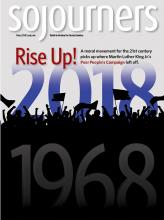THE PARABLE OF the mustard seed is beloved, but also dangerous. Like most beloved scripture passages, its revolutionary impact on its original hearers has been weakened over time, replaced by sentimental fondness.
Originally, the parable would have promised restorative justice to the economically afflicted, an undermining of borders and boundaries to the religious purists, and a warning against exulting oneself. Part of the genius of Jesus’ parables was to speak on multiple levels to multiple groups with the same words.
Noticing Jesus’ audiences for this teaching is profoundly important. Jesus was teaching in a gathering that included at least some religious leaders (Pharisees and scribes; see Matthew 12:38).
Leaving the house in which he was speaking, Jesus went down to the water to address an even larger crowd (Matthew 13:1-2). In his audience for the parable, there were a mix of religious leaders and ordinary people, including farmers of the fertile Galilean hills. Jesus used their respective expertise to provoke the different groups.
Tenant farmers
Jesus said the reign of God is like a mustard seed that a farmer took and sowed in the field. The agricultural workers who heard Jesus would have scoffed at this.
No one would ever sow mustard seed into any ground one owned. First-century farmers in Galilee with any agricultural acumen knew that mustard is a weed that reproduces rapidly and spreads indiscriminately. It chokes out other more-valuable crops and ruins the land for other uses. No farmer who loved the land would have planted a single seed of mustard in the field.
First-century farmers knew from Jesus’ story that the planter must not be a farmer who cared about the land, but someone who didn’t know anything about stewarding the land.
Read the Full Article

